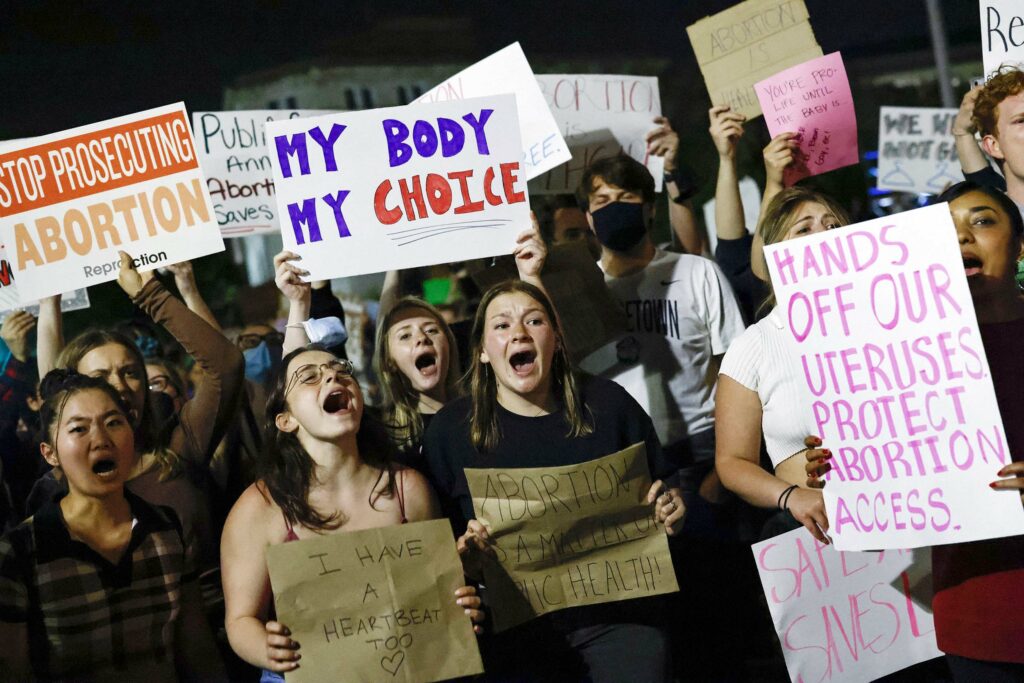Blog Post
The end of Roe should be celebrated without caveat
I was planning to write an article on the irritating reaction of some pro-life people to the revelation that Roe v. Wade may be overturned by next month. Some pro-lifers—especially those who pride themselves on being moderates, which is to say, not like the Trump voters and grassroots activists who use cringy terms like “murder” and generally act in an unsophisticated ways—are fixated on explaining to everyone that women will need support after Roe falls and that pro-lifers can’t just focus on the babies—as if that were ever the case, anyway. Thousands of crisis pregnancy centres and millions of private dollars have gone towards supporting both mothers and babies over the past decades, and to imply otherwise is to join the abortion industry in a lazy but politically convenient slander.
As it turned out, Samuel D. James wrote the article I was constructing in my head (and did a better job than I would have), and thus I’ll excerpt what he sent out on his excellent Substack rather reproducing his efforts:
Let me say a couple brief things about that last part, because I sense that some evangelical conversation about abortion in particular and public justice in general is confused on this point. It has commonly been suggested that opposing Roe v Wade is morally illegitimate unless it is accompanied with a kind of maximalist support for a social safety net. In other words, it has been suggested that you’re not really pro-life if you oppose abortion but support capitalism; you’re not really pro-life if you hate Roe v. Wade but don’t vote for candidates who vow to redistribute wealth; you’re not really pro-life if all you want is to stop abortion rather than providing extensive care and support for baby and mother.
Now, there’s an element of truth here that pro-life conservatives would do well to consider. It does matter whether or not we use laws and politics to create a world in which bearing and raising children is plausible. And those of us who identify as conservative voters need to realize that the “free market” was created for man, not man for the free market, and that given human corruption it is perfectly reasonable to think that markets could become inhumane and in need of moral intervention. Yes and good.
But those accusations of hypocrisy often come from an inability to receive justice with gratitude. I’m assuming, of course, that these accusations are from good faith and not simply coded opposition to the pro-life movement that would allow a left-leaning evangelical to keep selling her books within conservative institutions. That happens too, but it’s a topic for another day. There are many people who genuinely believe the pro-life movement is morally hypocritical for being mostly Republican and conservative, and those are the ones whom I believe are unable to receive justice with gratitude. Their rhetoric about human flourishing rings hollow because they are unable to receive an example of it when they see it. Instead, they fixate on the perceived “fairness” of the political process itself, angered and frustrated by the unequal and asymmetrical distribution of moral insight among American tribal lines.
This is the problem as well with those who hear the news of Roe’s demise by reminding everyone that “it wasn’t worth it” because Donald Trump was president. It’s not worth it? What does the word “it” mean here? The only possible reference must be to the actual lives of unborn people, and if so, this is a strange and incoherent idea: the idea that the saved lives of human beings are not worth the distastefulness of having had someone like Trump nominate someone like Brett Kavanaugh. You can believe those two men are the evilest men in the world and still think that the skull, arms, and spine a 20-week old infant should not be eligible for elective destruction. Justice does not require that you fall at the feet of people whom you dislike. It only requires that you call things what they are. If you can’t do the latter without feeling like you’re doing the former, something has gone amiss in your worldview of justice.
There’s a last group that merits mention here. Receiving justice with gratitude also means not valuing the demise of Roe v. Wade primarily for the way it might seem to give you a leg up on those whose voting instincts you disagree with. I’ve seen some people who avow to be passionate pro-lifers take the news about Roe and immediately demand contrition from fellow Christians who didn’t vote for Donald Trump. This kind of immediate response to the news of justice reveals a deformed conscience. I mean that. When people are given news that human beings might be saved with the force of law after decades upon decades of justice deferred, their instinctive response reveals what they really want. Do they really want lives to be saved? Or do they really want their political egos to be stroked? Sometimes you can do both! But here’s the problem: if you get into the habit of trying to do both, eventually you’ll insist on doing both even when you can’t. Your values will warp, and you may end up a different kind of person than you thought you were.
Receive justice with gratitude. Praise the God of heaven for his own right arm that works righteousness for him. Praise him for using pathetic sinners to achieve good things.
That is precisely it. When millions of babies have been killed and a great blow is struck to the regime that ended their lives—if indeed that blow is coming—than the correct response is gratitude. Pro-lifers know the fall of Roe is a first step. So was the Slave Trade Act of 1807, and the Emancipation Proclamation of 1863, or for that matter Brown v. Board of Education in 1954. But it is still a monumental step that deserves great celebration.









It costs approximately 100 thousand dollars to raise a baby from birth to age 18. Crisis pregnancy centres can’t possibly shoulder the entire cost of every single extra baby born, and the support they are able to provide can’t make up for the extreme inequality present in USA society today.
It’s not ‘receiving justice with gratitude’ when a baby’s life is saved, only to be born into poverty, neglect, abuse, hunger, or the foster system. “There’s always adoption” – there are sixteen thousand children still waiting to be adopted in the State of Georgia alone, and Roe hasn’t even been repealed yet.
Tell me, how can a single mom support a child on minimum wage in the States? Not very well she can’t.
I’m not saying that Roe shouldn’t be repealed, but every single person involved in it being repealed, or campaigning for it to be repealed, had better also be campaigning for equitable justice measures. Universal healthcare. Free maternal care. Free dental care for kids under 18. Free GP doctor’s visits for kids under 6. Working for Families tax credit. Universal heavily subsidized daycare. Protections in the workplace for mothers and pregnant women so they can’t be fired. Raising the federal minimum wage to fifteen dollars an hour. Having free school lunches at ALL schools. Erasing all interest on student debt (not the debt itself, just the outrageous interest) and capping the interest that can be charged to 3% per annum no matter the provider. Capping fees for community college and funding many more apprenticeships and high school apprenticeship gateway programs. Allowing people, regardless of their age, to go into a doctor’s office and buy 100 condoms for 5 dollars. Having mandatory nation wide Abstinence Plus sex education as opposed to allowing Abstinence Only sex education as an option.
I grew up in a country that had illegal abortion until 2020 with a few exceptions, and we had all of the above available. I’d support a similar law in the US to what my country had pre 2020, but for it to have even close to a decent effect, the US would need similar concessions to what we had and still have available for families and children.
I am on board with nearly all of that.